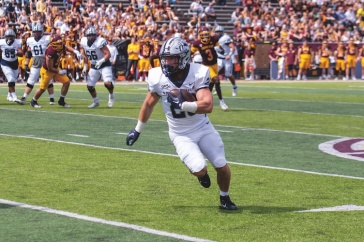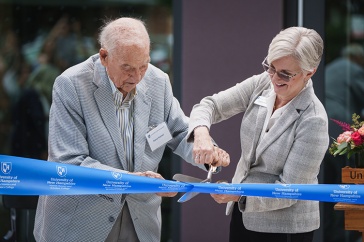
It all started with a cheek swab.
The football team was running a Be The Match station in the University of New Hampshire student cafeteria to support the National Marrow Donor program. A few players convinced Cameron Lyle, a sophomore track and field student-athlete at UNH, to get his cheek swabbed. The request took just five minutes and was forgotten by day’s end.
Throughout the next two years, Lyle had great success on the field, competing in track and field events including discus, shot put, hammer and the weight throw. He had collected a “pile of silver medals” heading into his senior season of competition and was poised to take home the gold in shot put at the conference championships to be held in May. Then he got a phone call.
After practice, in the locker room, he was told there was a high possibility he could be a bone marrow match for a complete stranger. Of the 12,000 blood cancer patients who require marrow, 70 percent do not have matches in their families.
“When I got the phone call, I was so shocked,” said Lyle. “I totally forgot I even signed up a couple of years before. Even then, I did not think I would be a match. The odds are so ridiculous.”
After additional testing, Lyle was confirmed as a definite match. There was no time to waste. The surgery was scheduled immediately for April 25. There was one catch: the surgery would take place one month before the end of his college career.
Lyle never feared the actual marrow donation surgery. He worried the most about telling his coach that he would be sitting out the final part of his senior season because of the surgery. His coach, though, was supportive. Jim Boulanger, director of New Hampshire’s track and field program, told Lyle that sports do not triumph life, they are merely a part of it. If you have the chance to save a life, do whatever it takes.
If Lyle chose to be a donor, his collegiate career would stop cold turkey without the closure a championship win would bring him. As he threw his last shot at the Stony Brook Invitational on April 20, his teammates surrounded him to help bring one chapter of his life to a close. For him this was closure. Hugs were shared and although it was not the ending he planned for, he was allowing a stranger the chance to start a new chapter of his own.
Even with that elusive conference championship within reach, Lyle never had any second thoughts about donating — especially when he learned about the man who would be receiving his marrow donation.
Lyle’s 28-year-old match was diagnosed with acute lymphoblastic leukemia a few days before Christmas in 2012. He had a fiancé and a nineteen-month-old son. For Lyle, this information solidified his decision to donate.
“I would have done it anyway,” said Lyle. “But knowing he is just starting his life, he has so much ahead of him, makes it worth it. It hits home because he is only a few years older than I am.”

The bone marrow donation procedure is by no means simple. While an average patient needs five or ten cubic centimeters of marrow, Lyle’s recipient required 1,800 cubic centimeters for his treatment. This staggering number is just less than two quarts.
A needle was put into Lyle’s pelvis more than 200 times in order to get enough marrow. Once the extraction was complete, the marrow was rushed out of the room and placed into a cooler. Like a scene out of a movie, it was airlifted to the unknown location where the patient was eagerly waiting. Lyle was told his recipient received the marrow within 18 hours of his initial procedure.
The following week was difficult for Lyle. He felt as though he had pulled every muscle in his lower back. He needed help putting on his pants. As he had throughout the whole process, he put his pain aside and thought about the man he had helped.
“Three days of pain is nothing compared to what this guy is going through,” said Lyle.
As time went on the pain became just soreness and eventually faded to nothing. Lyle received a card from his anonymous recipient dated the day he was scheduled to receive the marrow. The cover showed a young boy, around two or three, dead lifting 500 pounds. The inside simply said, “Anything is possible.”
Be The Match, a donor registry operated by the National Marrow Donor Program, has very strict guidelines of communication between the donor and the recipient. No physical talking between the two is permitted until one year after the procedure, and no news about the donation can be shared until 30 days post operation. Lyle received an update in July, three months after his donation, that the man’s scans showed no sign of leukemia. He was clear. He even left the hospital five weeks ahead of schedule. Anything is possible.
Lyle continued his everyday life after that life-changing day; he graduated from college in May and now works as the marketing director at the Bank of New Hampshire Pavilion at Meadowbrook, a concert venue in Guilford, N.H. He is just like any other recent college graduate, except that his donation has led to incessant interview requests. The awards, recognition and media coverage Lyle has received completely baffle the 22-year-old.
Lyle was equally shocked when he learned that he would be awarded the NCAA’s Award of Valor. The award recognizes a courageous act or noteworthy bravery by an individual associated with intercollegiate athletics.
“I don’t get it,” said Lyle. “I view this whole thing as something anyone would do. It’s not as huge as people are making it out to be. I guess it’s just the type of person I am. After all the awards I’ve been getting, I keep asking, ‘wouldn’t anyone do the same thing?’”
Since his bone marrow donation, Lyle has become a huge activist for Be The Match and encourages all to join the registry. In the first three months after he made headlines, Be The Match registrations tripled.
Lyle couldn’t be happier. He organized a Be The Match registration event at a concert in September at the live performance venue where he works. Every person in the 8,000-seat venue had their cheeks swabbed in hopes of someday helping some in need.
Though Lyle is still surprised by what has unfolded over the last six months, he would not change anything. To him, the bone marrow donation was what any individual would do, just another day in life. And in life, anything is possible.
Written By Alexandra Assimon, National Collegiate Athletic Association
-
Written By:
Staff writer | Communications and Public Affairs
















































